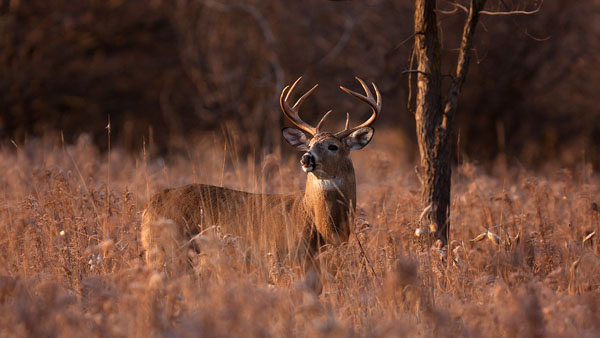SB 32 would require the DNR to establish a pilot program to combat chronic wasting disease in deer.

Shutterstock photo.
INDIANAPOLIS - The National Deer Association is urging Indiana legislators to vote no on Senate Bill 32.
The bill, authored by Senator Susan Glick, would requires the Department of Natural Resources (DNR) to establish a pilot program to combat chronic wasting disease in deer.
Chronic wasting disease (CWD) is a fatal, neurodegenerative disease that affects deer, elk and other hoofed animals. CWD is caused by a misfolded protein called a prion. Prions accumulate in the brain and spinal cord, leading to weight loss, lack of coordination, drooling, listlessness, abnormal behavior, and death.
Under the bill, the DNR would have to establish the chronic wasting disease pilot program to enhance the genetic durability of Indiana's white-tailed deer population no later than December 31, 2025.
The department would:
- collect DNA samples to establish a baseline of average genetic codon markers and genomic breeding values for native, free-range Indiana white-tailed deer
- establish a testing location for DNA samples
- create and operate a captive breeding program for native free-range Indiana white-tailed deer that identifies deer genetically resistant to CWD, breeds the genetically resistant to increase the population's genetic resistance to CWD, and release the bred female and male deer between February and April 2027.
In a letter to the General Assembly, the National Deer Association says the bill "compromises the robust rural economy that is rooted in wild deer hunting in Indiana, as well as professional wildlife management in the state."
"While the bill may appear to present a solution to the growing issues related to CWD in Indiana, this path forward presents significant risks to Indiana’s wildlife, compromises the state’s ability to manage wildlife, and would constitute a substantial financial burden to the Indiana DNR. The best available science suggests that breeding “genetically resistant” deer in captivity is likely to take decades, if it is possible at all," reads a portion of the letter.
The organization adds that even if the development of "genetically resistant" deer become a biological reality, it does not present a feasible management solution for mitigating the impacts of CWD in wild deer.
"For that to be the case, wild deer would have to be eliminated and replaced with these supposedly-genetically-superior captive raised deer, at significant expense to the state," the letter continued.
Currently, there is no cure for CWD. Infected animals are euthanized to prevent further spread of the disease, which is spread through direct contact with infected animals, such as through saliva, urine, or feces. It can also be transmitted through contaminated soil or vegetation.
While there is no evidence that CWD can infect humans, it is recommended to avoid handling or consuming meat from infected animals.
The first hearing in committee for this bill is scheduled for Monday afternoon.

 Mike Braun Sworn-in as Indiana's 52nd Governor
Mike Braun Sworn-in as Indiana's 52nd Governor
 Florence Police Rescue One from Freezing Lake
Florence Police Rescue One from Freezing Lake
 Local Government Reorganization Bill Would Change Fire Services
Local Government Reorganization Bill Would Change Fire Services
 Friendship Fire Celebrates Members at Annual Banquet
Friendship Fire Celebrates Members at Annual Banquet
 VIDEO: First Look at Friendship State Bank's Bright Branch
VIDEO: First Look at Friendship State Bank's Bright Branch
 Local United Way Marks 2024 Accomplishments
Local United Way Marks 2024 Accomplishments












